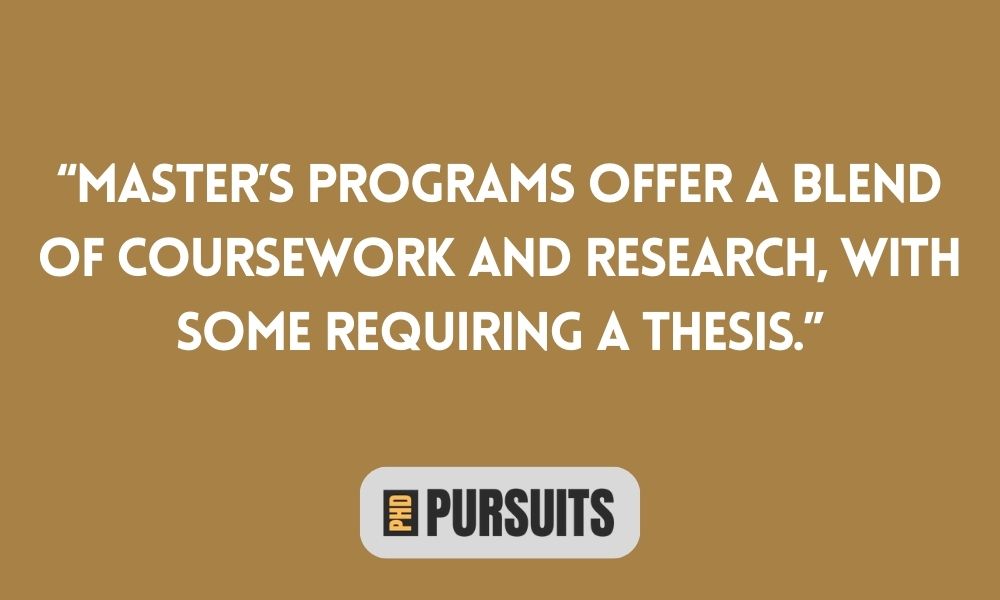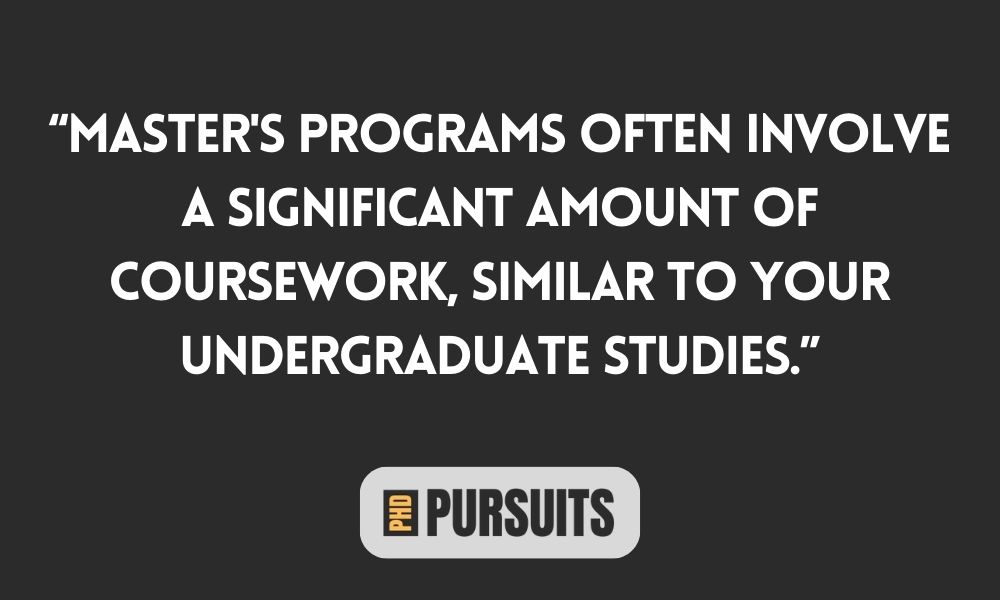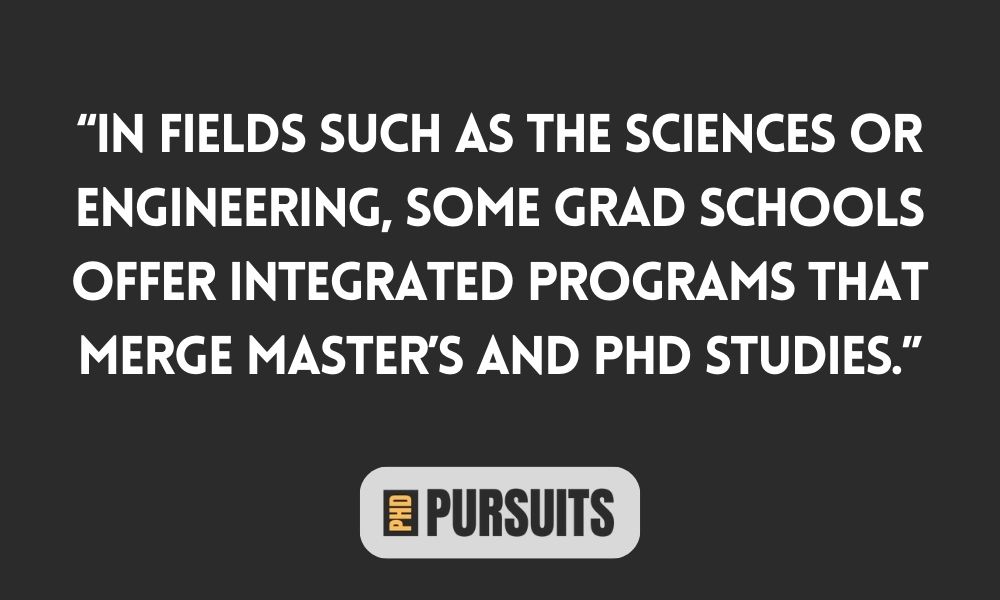One thing many may wonder is the differences between a masters and a PhD, and how difficult is it to get a PhD done. What is the difference between a Masters and A PhD?
Masters degree and PhD can differ in several ways:
- Purpose and Focus
- Duration
- Coursework
- Research Depth
- Independence
- Professional Outcomes
- Financial Investment and Return
- Admission Requirements
In this post, we explore what is the difference between a masters and a PhD. We also look at some common questions about the subject, such as if you can get a PhD without a masters degree.
| Aspect | Masters | PhD |
|---|---|---|
| Purpose and Focus | Deepens knowledge with coursework and research. | Focuses on original research and a dissertation. |
| Duration | 1-2 years, depending on study mode. | 3-6 years, sometimes longer due to research. |
| Coursework | Coursework-heavy with lectures and exams. | Less coursework, more focus on research and writing. |
| Research Depth | Research involves a thesis without new knowledge. | Intensive research to advance the field. |
| Independence | Guided independence, especially on thesis. | Expected to independently guide own’s research. |
| Professional Outcomes | Aims for professional advancement. | Leads to academia, research, or specialized roles. |
| Financial Investment and Return | Less time and financial investment. | Financial aid like stipends and grants more readily available. |
| Admission Requirements | Undergrad degree and sometimes work experience needed. | Requires master’s degree, strong record, and proposals. |
What Is A Masters Degree?
A master’s degree centers on advanced knowledge and skills within a particular discipline. Embarking on a master’s degree is a pivotal step for many aiming to deepen their expertise in a specific field.
This degree can serve as a stepping stone for those considering a PhD or as a terminal degree for certain professions. A master’s degree can significantly boost your career prospects and salary potential in many fields, particularly in specialized or advanced roles.
Master’s programs offer a blend of coursework and research, with some requiring a thesis, a comprehensive project that showcases the student’s ability to conduct independent research and present their findings.

The journey to complete a master’s degree varies, typically ranging from one to two years, contingent on the course load and whether you’re attending full or part-time; part-time degrees usually take longer.
The application process for a master’s program can be rigorous, often requiring:
- an undergraduate degree,
- letters of recommendation, and
- sometimes relevant work experience.
This process is designed to ensure candidates are well-prepared for the challenging coursework and research components ahead.
For many, the choice to pursue a master’s degree hinges on the desire to:
- gain a competitive edge in the job market,
- increase salary prospects, or
- delve deeper into a beloved discipline.
Whether you’re fresh from undergrad or a seasoned professional looking to pivot or advance in your career, a master’s degree can offer the specialized knowledge and credentials needed to achieve your goals.
What Is A Doctorate / Ph.D?
A PhD, or Doctor of Philosophy, is the highest academic degree you can get. It embodies a rigorous journey of:
- original research,
- critical thinking, and
- contribution to a specific field.

This path isn’t merely an extension of graduate studies but a deep dive into uncharted territories of knowledge. Embarking on a PhD can profoundly influence your career path, opening doors to academia, research institutions, and high-level positions in various industries.
The heart of a PhD program is the dissertation, an extensive, detailed document that presents the PhD candidate’s original research. This task requires a blend of creativity, analytical skills, and perseverance, often spanning years.
The process starts with identifying a unique research question, followed by exhaustive study, experimentation, or theoretical analysis under the guidance of a supervisory committee.
Unlike master’s degrees, which combine coursework with some research elements, a PhD degree is predominantly research-oriented. Coursework in a PhD program, where present, serves to augment the student’s research capabilities and domain knowledge.
The duration to complete a PhD can vary widely, generally taking anywhere from three to even ten years, depending on the:
- research field,
- complexity of the dissertation, and
- the student’s pace.
The application process for a PhD program is notably competitive, demanding a strong academic record, often a master’s degree, detailed research proposals, and letters of recommendation.
The journey shapes students into independent researchers, equipping them with skills to tackle complex problems and contribute novel insights to their field.
PhD graduates are revered for their expertise and often lead the charge in innovation, policy-making, and strategic decision-making in their respective domains.
For those passionate about research and committed to advancing knowledge, a PhD offers an unparalleled opportunity to make a lasting impact.
What Is The Difference Between A Masters And A PhD?
Masters and PhD are both advanced degrees, with some major differences. Here’s some for you to think about:
Purpose and Focus
A master’s degree is designed to deepen your knowledge in a particular field, building on what you learned during your bachelor’s degree. It’s about advancing your understanding and enhancing your skills, often with a mix of coursework and research.
In contrast, a PhD is centered around original research. It’s about creating new knowledge, not just learning what’s already known.
PhD students work on a dissertation, a substantial piece of independent research that contributes new insights to their field.
Duration
Time is a significant factor. A master’s degree typically takes one to two years to complete, depending on whether you’re studying full-time or part-time.
A PhD can take anywhere from three to six years, sometimes as long as 10 years. The duration of a PhD is less predictable because it’s tied to your research project’s complexity.
Many students also started their PhD studies at a more mature years, were responsibilities like family and relationships are heavier.
Coursework
Master’s programs often involve a significant amount of coursework, similar to your undergraduate studies. You might:
- attend lectures,
- complete assignments, and
- take exams.
PhD programs also start with coursework but to a lesser extent. The primary focus quickly shifts to research and writing your dissertation. You will spend time doing more research paper writing, as well as getting your dissertation ready for Viva Voce.

Research Depth
While both degrees involve research, the depth and nature of this research differ. Master’s students might complete a thesis, a project that, while significant, doesn’t require creating new knowledge.
PhD research is more intensive. You’re expected to contribute original ideas that advance your field, culminating in your dissertation. This means delving into areas that not many researchers have explored.
Independence
PhD students enjoy a higher degree of independence in their studies. While you’ll have a supervisor, the expectation is that you’ll guide your own research, from inception to completion. In fact, it is expected that you operate with independence, as that is how you will work as later on after your Ph.D
Master’s students also work independently, especially while working on their thesis, but they often have more structured guidance and a clearer framework provided by their program.
Professional Outcomes
Your career path might influence your choice. Master’s degrees are often more professionally oriented. They can prepare you for advancement in your current field or help you pivot to a new area.
PhDs are academic and research-intensive, ideal for those aspiring to work in:
- academia,
- research institutions, or
- highly specialized industry roles.
PhD holders also have more job openings that masters holders don’t have, especially in these fields
Financial Investment and Return
The cost of tuition and the time you spend not earning a full-time salary are significant considerations. Master’s degrees are shorter, so they’re generally less of a financial and time investment than PhDs.
Masters’ less stringent requirements also means many students can study while working, which helps with the finances.

However, PhD programs often offer financial help, which can offset some of the costs. Many universities understand the commitment required to complete a PhD, and so they help in ways the can financially. These could involve funding opportunities like:
- stipends,
- grants, and
- assistantships.
Admission Requirements
Admission into a master’s program typically requires an undergraduate degree and sometimes relevant work experience. The competition may not be as fierce, but do not expect to just walk into a program.
For a PhD, the requirements are more stringent. You’ll likely need:
- a master’s degree in a related field,
- a strong academic record,
- detailed research proposals, and
- letters of recommendation.
The application process is more competitive, reflecting the advanced level of study and research.
These distinctions underscore the importance of aligning your educational pursuits with your personal and professional goals.
Whether you choose to pursue a master’s degree or embark on the demanding journey of a PhD, both paths offer rewarding experiences and the opportunity to significantly advance your knowledge and skills.
Can You Get A PhD Degree Without Masters?
In some cases, you can leap directly to a PhD program with just your undergraduate degree in hand. This possibility hinges on various factors, including:
- the field of study,
- the specific requirements of the PhD program, and
- the policies of the university.
In fields such as the sciences or engineering, some grad schools offer integrated programs that merge master’s and PhD studies. In these programs, you start focusing on doctoral-level work early on, sometimes bypassing the formal requirement of earning a master’s degree altogether.

The coursework you undertake is aimed directly at preparing you for your PhD dissertation, the cornerstone of your doctoral study.
The application process for such direct-entry PhD programs is rigorous. Prospective PhD candidates must demonstrate:
- exceptional academic records,
- a strong research proposal, and often,
- the backing of a potential supervisor
The ability to engage in independent research, a clear vision for your PhD project, and alignment with the department’s research areas are crucial.
Opting for this route can shorten your academic journey, allowing you to focus on your doctoral research and career prospects sooner. It’s a challenging but rewarding path for those with a clear research direction and a passion for diving deep into their chosen field from the outset.
Are There Other Doctoral Degrees Other Than PhD?
While the PhD might be the most recognized doctorate degree out there, it’s just one of many paths that lead to the pinnacle of academic achievement.
Across various fields, there are specialized doctorates tailored to specific careers, each with its own set of:
- requirements,
- coursework, and
- graduation requirements.

Take, for example, the Doctor of Medicine (MD) for aspiring physicians or the Juris Doctor (JD) for future lawyers. These professional doctorates focus more on practical skills and less on original research, preparing you for specific career paths.
Then there’s the Doctor of Education (EdD), which is ideal for those aiming to lead and innovate in educational settings, focusing on applying research to solve real-world problems in education.
In the world of business, the Doctor of Business Administration (DBA) stands out. It’s designed for executives looking to apply research and advanced practice to business challenges, differing from a PhD in Business, which is more theory and research-oriented.
For those inclined towards engineering and technology, the Doctor of Engineering (DEng) offers an avenue to contribute to technological advancements through applied research projects, often in collaboration with industries.
Each of these doctoral degrees has its own set of prerequisites, from the application process to the years required to complete. What they share is a commitment to advancing knowledge and skills in their respective fields.
Whether through a dissertation, thesis, or a series of practical projects, these programs push you to the forefront of your discipline, opening doors to advanced career prospects and, in many cases, a path toward teaching and research at the highest levels.
Difference Between Masters And PhD: Explained
While both master’s and PhD degrees mark significant academic achievements, they cater to different goals and career paths. A master’s degree focuses on enhancing knowledge and skills within a specific field, offering a blend of coursework and research.
In contrast, a PhD is centered on original research, contributing new knowledge to a discipline.
Your choice between the two depends on your professional aspirations, commitment to research, and the level of expertise you wish to attain in your field.

Dr. JW Ong holds academic degrees, including a Ph.D. in Applied Linguistics from universities in New Zealand, Malaysia, and the UK. He started PhDPursuits.com as a way to share the experience he wish he would have had known before embarking on his PhD.

